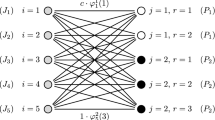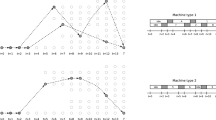Abstract
Most deterministic production scheduling models assume that the processing time of a job on a machine is fixed externally and known in advance of scheduling. However, in most realistic situations, apart from the machines, it requires additional resources to process jobs, and the processing time of a job is determined internally by the amount of the resources allocated. In these situations, both the cost associated with the job schedule and the cost of the resources allocated should be taken into account. Therefore, job scheduling and resource allocation should be carefully coordinated and optimized jointly in order to achieve an overall cost-effective schedule. In this paper, we study a parallel-machine scheduling model involving both job processing and resource allocation. The processing time of a job is non-increasing with the cost of the allocated resources. The objective is to minimize the total cost including the cost measured by a scheduling criterion and the cost of all allocated resources. We consider two particular problems of this model, one with the scheduling criterion being the total weighted completion time, and the other with that being the weighted number of tardy jobs. We develop a column generation based branch and bound method for finding optimal solutions for these NP-hard problems. The method first formulates the problems as set partitioning type formulations, and then solves the resulting formulations exactly by branch and bound. In the branch and bound, linear relaxations of the set partitioning type formulations are decomposed into master problems and single-machine subproblems and solved by a column generation approach. The algorithms developed based on this method are capable of solving the two problems with a medium size to optimality within a reasonable computational time.
Similar content being viewed by others
References
Alidaee, B. and A. Ahmadian. (1993). “Two ParallelMachine Sequencing Problems Involving Controllable Job Processing Times.” European Journal of Operational Research 70, 335–341.
Alidaee, B. and G. Kochenberger. (1996). “A Framework for Machine Scheduling Problems with Controllable Processing Times.” Production and Operations Management 5(4), 391–405.
Chan, L.M.A., A. Muriel, and D. Simchi-Levi. (1998). “Machine Scheduling, Linear Programming and List Scheduling Heuristics.” Operations Research 46, 729–741.
Chen, Z.-L., Q. Lu, and G. Tang. (1997). “Single Machine Scheduling with Discretely Controllable Processing Times.” Operations Research Letters 21, 69–76.
Chen, Z.-L. and W.B. Powell. (1999a). “Solving Parallel Machine Scheduling Problems by Column Generation.” INFORMS Journal on Computing 11, 78–94.
Chen, Z.-L. and W.B. Powell. (1999b). “A Column Generation Based Decomposition Algorithm for a Parallel Machine Scheduling Just-in-Time Scheduling Problem.” European Journal of Operational Research 116, 221–233.
Cheng, T.C.E., Z.-L. Chen, and C.-L. Li. (1996). “Single-Machine Scheduling with Trade-Off between Number of Tardy Jobs and Resource Allocation.” Operations Research Letters 19, 237–242.
Cheng, T.C.E., Z.-L. Chen, C.-L. Li, and B.M.-T. Lin. (1998). “Scheduling to Minimize the Total Compression and Late Costs.” Naval Research Logistics 45, 67–82.
Cheng, T.C.E. and M.Y. Kovalyov. (1995). “SingleMachine Batch Scheduling with Deadlines and Resource Dependent Processing Times.” Operations Research Letters 17, 243–249.
Daniels, R.L., B.J. Hoopes, and J.B. Mazzola. (1996). “Scheduling Parallel Manufacturing Cells with Resource Flexibility.” Management Science 42, 1260–1276.
Daniels, R.L., B.J. Hoopes, and J.B. Mazzola. (1997). “An Analysis of Heuristics for the Parallel-Machine Flexible-Resource Scheduling Problem.” Annals of Operations Research 70, 439–472.
Daniels, R.L. and J.B. Mazzola. (1994). “Flow Shop Scheduling with Resource Flexibility.” Operations Research 42, 504–522.
Graham, R.L., E.L. Lawler, J.K. Lenstra, and A.H.G. Rinnooy Kan. (1979). “Optimization and Approximation in Deterministic Sequencing and Scheduling: A Survey.” Annals of Discrete Mathematics 5, 287–326.
Janiak, A. and M.Y. Kovalyov. (1996). “Single Machine Scheduling Subject to Deadlines and Resource Dependent Processing Times.” European Journal of Operational Research 94, 284–291.
Karp, R.M. (1972). “Reducibility Among Combinatorial Problems.” In R.E. Miller and J.W. Thatcher (eds.), Complexity of Computer Computations, pp. 85–103. New York: Plenum.
Lasdon, L.S. (1970). Optimization Theory for Large Systems. New York: Macmillan.
Lee, C.-Y. and Z.-L. Chen (2000). “Scheduling of Jobs and Maintenance Activities on Parallel Machines.” Naval Research Logistics 47, 145–165.
Nowicki, E. (1993). “An Approximation Algorithm for the m-Machine Permutation Flow Shop Scheduling Problem with Controllable Processing Times.” European Journal of Operational Research 70, 342–349.
Nowicki, E. and S. Zdrzalka. (1990). “A Survey of Results for Sequencing Problems with Controllable Processing Times.” Discrete Applied Mathematics 25, 271–287.
Nowicki, E. and S. Zdrzalka. (1995). “A Bicriterion Approach to Preemptive Scheduling of Parallel Machines with Controllable Job Processing Times.” Discrete Applied Mathematics 63, 237–256.
Panwalker, S.S. and R. Rajagopalan. (1992). “Single-Machine Sequencing with Controllable Processing Times.” European Journal of Operational Research 59, 298–302.
Pinedo, M. (1995). Scheduling: Theory, Algorithms, and Systems. Englewood Cliffs, NJ: Prentice Hall.
Trick, M.A. (1994). “Scheduling Multiple Variable-Speed Machines.” Operations Research 42, 234–248.
Van den Akker, J.M., J.A. Hoogeveen, and S.L. van de Velde. (1999). “Parallel Machine Scheduling by Column Generation.” Operations Research 47, 862–872.
Van Wassenhove, L.N. and K.R. Baker. (1982). “A Bicriterion Approach to Time/Cost Trade-Offs in Sequencing.” European Journal of Operational Research 11, 48–52.
Vickson, R.G. (1980a). “Choosing the Job Sequence and Processing Times to Minimize Processing Plus Flow Cost on a Single Machine.” Operations Research 28, 1155–1167.
Vickson, R.G. (1980b). “Two Single-Machine Sequencing Problems Involving Controllable Job Processing Times.” AIIE Transactions 12, 258–262.
Zhang, F., G. Tang, and Z.-L. Chen. (2001). “A 3/2-Approximation Algorithm for Parallel Machine Scheduling with Controllable Processing Times.” Operations Research Letters 29, 41–47.
Author information
Authors and Affiliations
Rights and permissions
About this article
Cite this article
Chen, ZL. Simultaneous Job Scheduling and Resource Allocation on Parallel Machines. Annals of Operations Research 129, 135–153 (2004). https://doi.org/10.1023/B:ANOR.0000030685.31167.11
Issue Date:
DOI: https://doi.org/10.1023/B:ANOR.0000030685.31167.11




